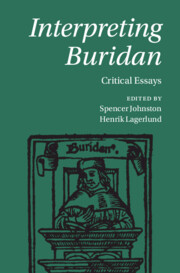Book contents
- Interpreting Buridan
- Interpreting Buridan
- Copyright page
- Dedication
- Contents
- Contributors
- Preface
- Abbreviations
- Introduction
- 1 The Philosopher as Arts Master
- 2 Principles in Buridan’s Logic of Consequences
- 3 Buridan on Paradox
- 4 Modality and Temporality in Buridan’s Logic
- 5 A Paradigm Change within Medieval Philosophy
- 6 Buridan’s Internalism
- 7 John Buridan on the Ontological Status of Artifacts
- 8 John Buridan on Final Causality
- 9 Female Physiology in John Buridan’s Quaestiones de secretis mulierum
- 10 Buridan on the Value of Emotions
- 11 Buridan on Happiness and the Good Life
- References
- Index
10 - Buridan on the Value of Emotions
Published online by Cambridge University Press: 01 February 2024
- Interpreting Buridan
- Interpreting Buridan
- Copyright page
- Dedication
- Contents
- Contributors
- Preface
- Abbreviations
- Introduction
- 1 The Philosopher as Arts Master
- 2 Principles in Buridan’s Logic of Consequences
- 3 Buridan on Paradox
- 4 Modality and Temporality in Buridan’s Logic
- 5 A Paradigm Change within Medieval Philosophy
- 6 Buridan’s Internalism
- 7 John Buridan on the Ontological Status of Artifacts
- 8 John Buridan on Final Causality
- 9 Female Physiology in John Buridan’s Quaestiones de secretis mulierum
- 10 Buridan on the Value of Emotions
- 11 Buridan on Happiness and the Good Life
- References
- Index
Summary
Scholars agree that Buridan’s commentary on the Nicomachean Ethics gives far more attention to Seneca’s works than other commentaries of the period do. Buridan cites Seneca on one topic after another, always respectfully and often with praise. But did his study of Seneca lead him to a generally negative view about the role of emotions in morality? On this topic scholars clearly disagree. One claims that there are hardly any positive references to the emotions in Buridan’s entire Ethics commentary. Buridan emphasizes instead that emotions must be repressed by the will. Another scholar claims, to the contrary, that Buridan is in no sense a disciple of Seneca. For example, he follows Aristotle in arguing that anger can have genuine value and should not be completely eliminated. This essay examines Buridan’s account of anger and his discussions of some other emotions to clarify his views on how emotions contribute to a virtuous life.
- Type
- Chapter
- Information
- Interpreting BuridanCritical Essays, pp. 178 - 198Publisher: Cambridge University PressPrint publication year: 2024
- 1
- Cited by

